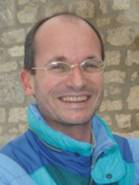 |
||
Home > TERATEC FORUM > Workshop 4
Big data, multiscale and materials
High-throughput calculations of molecular properties in the MedeA® environment
Xavier ROZANSKA, MATERIALS DESIGN
This work demonstrates the systematic prediction of thermodynamic properties for batches of thousands of molecules using automated procedures. This is accomplished with newly developed tools and functions within the Material Exploration and Design Analysis (MedeA®) software environment, which handles the automatic execution of sequences of tasks for large numbers of molecules including the creation of 3D molecular models from 1D representations, systematic exploration of possible conformers for each molecule, the creation and submission of computational tasks for property calculations on parallel computers, post-processing for comparison with available experimental properties and automatic entry of the input and output data into a database.
After the description of the different MedeA® functionalities and methods that make it easy to perform such large number of computations, we illustrate the strength and power of the approach with selected examples from molecular mechanics and quantum chemical simulations. Specifically, comparisons of thermochemical data with quantum-based heat capacities and standard energies of formation have been obtained for more than 2 000 compounds, yielding average deviations with experiments of less than 4% with the Design Institute for Physical PRoperties (DIPPR) database. The automatic calculation of the density of molecular fluids is demonstrated for 192 systems. The relaxation to minimum-energy structures and the calculation of vibrational frequencies of 5 869 molecules are evaluated automatically using a semi-empirical quantum mechanical approach with a success rate of 99.9%.
The present approach is scalable to large number of molecules, thus opening exciting possibilities in view of the ever increasing power, parallelism, and storage capacity of high-performance computers.
 |
Xavier ROZANSKA. Prior to joining Materials Design® 4 years ago, Xavier Rozanska was a research scientist in different countries and places. He worked for 4 years in the Netherlands after obtaining a master’s diploma in computer science and theoretical chemistry. He obtained a PhD in chemistry under the supervision of Rutger van Santen at the Technical University of Eindhoven. He won the ASML award in applied research for his PhD thesis work on the ab initio analysis of the elementary mechanisms of reactions catalyzed by zeolite. For 3 years, he was an Alexander von Humboldt Foundation fellow and postdoc at the Humboldt University in Berlin, Germany, where he carried out ab initio studies of transition metal oxide and zeolite catalysts together with Joachim Sauer. For almost 6 years, he worked at the Universities Pierre and Marie Curie (Paris), and Henri Poincaré (Nancy), and at the Ecole Normale Supérieure de Lyon in France. While there, he analyzed biochemical and organic and inorganic chemical systems using static and dynamic methods at quantum and molecular mechanic levels. He also participated in method and software developments (X-ray diffraction, QM/QM and QM/MM, VASP GPU porting). He was involved in research projects leading activities, in particular within the Global Research Partnership granted by KAUST (CADENCED project). Xavier Rozanska is author or co-author of more than 45 articles in international peer-reviewed journals and 5 contributions in edited books. |